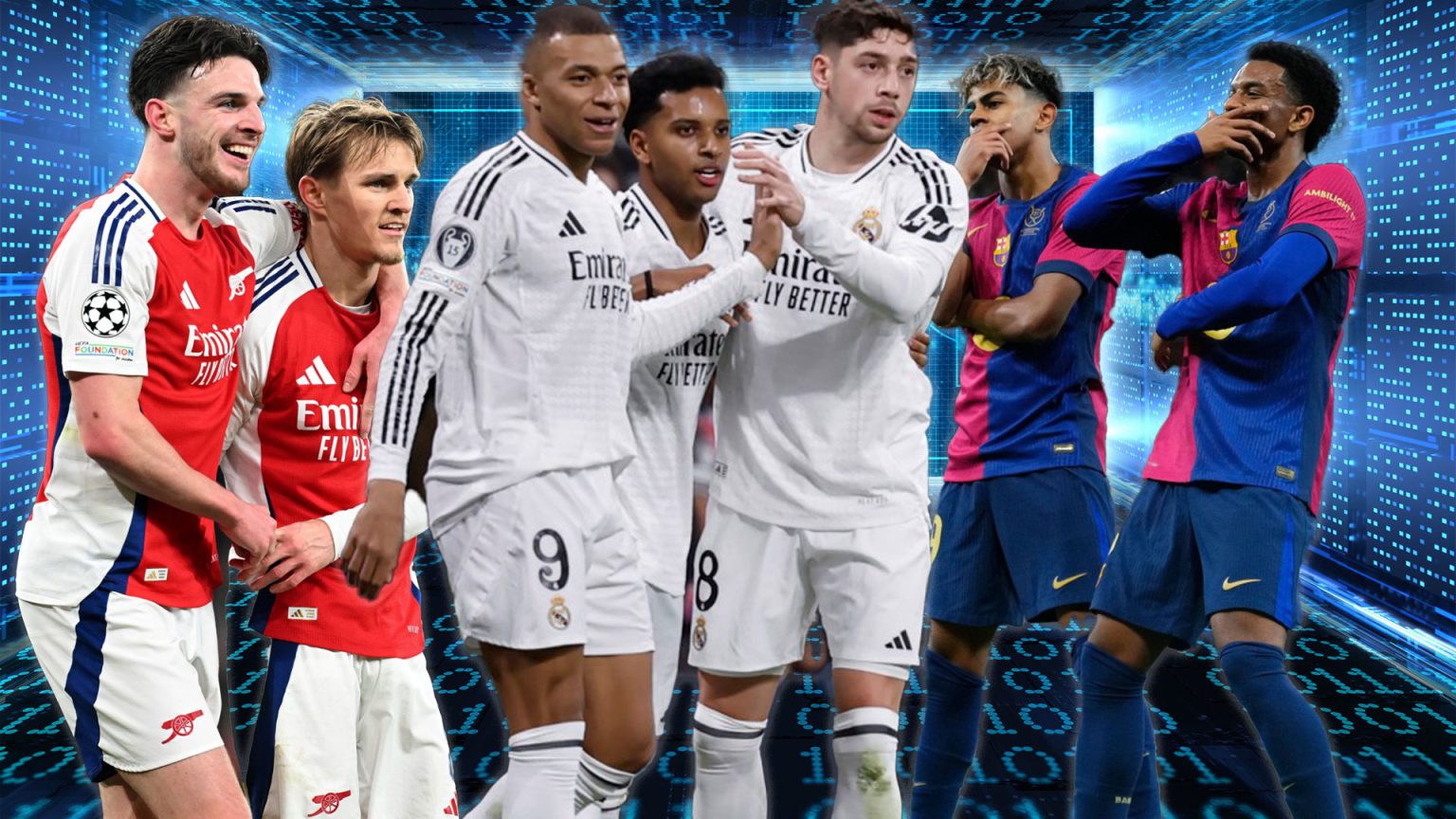Bettingexpert’s supercomputer, BETSiE, has projected a surprising outcome for the Champions League, defying traditional favorites and crowning Arsenal as the most likely winner. After running 100,000 simulations, incorporating factors such as previous season results, pre-season performance, current season results, and expected goals (xG), BETSiE predicts Arsenal has a 26.3% chance of lifting the trophy, their first ever Champions League title. This puts them ahead of Liverpool, who, despite topping the group stage table, are assigned a 21.6% chance of victory.
Real Madrid, with their rich Champions League history, comes in third with a 9.4% probability of winning. However, their projected league position outside the top eight means they would need to progress through a play-off round, adding complexity to their path to the final. Barcelona, despite being the only team mathematically capable of overtaking Liverpool in the league, has a lower projected win probability of 8.9%. This highlights the unpredictable nature of the knockout stages, where current form doesn’t always translate to success.
The simulations paint a precarious picture for several European giants. Bayern Munich, Paris Saint-Germain (PSG), and Manchester City are all predicted to finish outside the top eight, necessitating playoff round victories to continue their Champions League campaigns. Their respective win probabilities are clustered closely together: Bayern Munich at 6.7%, PSG at 6.5%, and Manchester City at 6.2%. This demonstrates the competitive landscape, where even small margins can significantly impact a team’s chances.
Inter Milan, Bayer Leverkusen, and Atalanta round out the top ten most likely winners, with win probabilities of 3.9%, 3.7%, and 1.7% respectively. Aston Villa, a surprise performer in the group stage, sits just outside the top eight but with a relatively high probability (68.8%) of securing a top-eight finish. However, their overall chance of winning the tournament remains slim at 1.5%. This underscores the difficulty of translating group stage success into ultimate victory.
The supercomputer’s predictions highlight the long road ahead, even for top performers. Teams below Aston Villa each have less than a 1% chance of winning, including former champions like AC Milan, Juventus, Benfica, Borussia Dortmund, and Feyenoord. Aspiring first-time winners Atletico Madrid, Monaco, Sporting CP, and Lille also face an uphill battle. This emphasizes the competitive intensity of the Champions League, where even historically successful teams face significant challenges.
Finally, any team outside the top 20 is assigned a 0% chance of winning the competition, a sobering statistic for teams like Celtic, who have qualified for a play-off spot. This stark prediction underscores the significant gap between the top contenders and the rest of the field, as perceived by the supercomputer’s model. While upsets can and do happen in football, BETSiE’s simulations suggest a clear hierarchy in this year’s Champions League. The data suggests a compelling narrative of underdog triumph for Arsenal, a challenging path for established giants, and a long shot for the remaining teams.
The supercomputer’s methodology, though seemingly complex, relies on a combination of historical data and current performance indicators. By analyzing past results, pre-season form, and current standings, along with the crucial metric of expected goals, BETSiE attempts to project the most likely outcomes. While these predictions are not guarantees, they offer an intriguing perspective on the potential unfolding of the Champions League. The unexpected crowning of Arsenal as the favorite, the struggles predicted for traditional powerhouses, and the long odds faced by other contenders create a compelling narrative for the remainder of the tournament.
It is important to remember that these are just projections, and the beautiful game of football is renowned for its unpredictability. Unexpected results, individual brilliance, and the ever-present element of luck can all dramatically alter the course of a tournament. However, the supercomputer’s analysis provides a fascinating data-driven perspective on the potential storylines that could emerge as the Champions League progresses. Will Arsenal defy the odds and claim their first title? Will the established giants overcome their projected struggles? Only time will tell.
The predictions offer fans and analysts alike food for thought as they consider the remaining matches. The supercomputer’s insights can spark debate and discussion, adding another layer of excitement to the already thrilling Champions League campaign. While the actual results may ultimately diverge from the projections, the data-driven predictions provide a valuable framework for understanding the relative strengths and weaknesses of the competing teams. They also highlight the potential for surprises and upsets, which are an integral part of the drama and excitement of the Champions League.
Ultimately, the beauty of football lies in its unpredictability. While the supercomputer offers its probabilistic view, the true story of the Champions League will unfold on the pitch. The remaining matches promise thrilling encounters, stunning goals, and dramatic moments that will captivate audiences worldwide. Whether the eventual outcome aligns with BETSiE’s predictions or defies them entirely, the journey to the final is sure to be a captivating spectacle.
The Champions League, with its blend of historical prestige and contemporary competition, continues to be a source of fascination for football fans across the globe. The supercomputer’s predictions, while not definitive, add another dimension to the narrative, prompting speculation and debate about the potential outcomes. As the tournament progresses, the interplay between data-driven projections and on-field reality will undoubtedly create a compelling storyline, culminating in the crowning of a new European champion.











